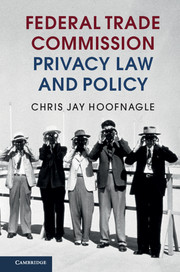Introduction
Published online by Cambridge University Press: 05 February 2016
Summary
At the Pennsylvania Avenue entrance to the Federal Trade Commission (FTC) headquarters in Washington, DC, one encounters a statue of a powerful man wrestling an enormous, elegant horse. The beast has a sinister look. Its ears turned back, it is about to bite the man. The man's exaggerated brawn is not enough to bridle the menace, as the horse's positioning is dominant. While titled Man Controlling Trade, the work suggests that trade is an irrational evil that will escape man's control.
Just around the corner, on Constitution Avenue, stands an accompanying work. But in this work, the man appears sinister, a vengeful punisher of the horse. He has a powerful hold upon a more sympathetic animal. The man has bridled the horse.
In crafting these two works, Michael Lantz (1908–1988) captured the ambivalence many have about the regulation of trade. Businesses are a driver of wonderful innovations and conveniences, and an engine of American power. But at the same time, without some control, business can run wild, serving only itself.
The statuaries also serve as a metaphor for supporters and critics of the FTC, now a 100-year-old institution. Some see it as a misguided, even harmful, burden to business, while others view any discipline it can muster against business as a good.
This book will explain these tensions through the lens of the FTC as a primary regulator of information privacy. Its activities, often in the form of public settlement agreements with companies, form the most important regulation of information privacy in the United States. Given the political economy of online regulation, Congress is unlikely to take action on online privacy. For the immediate future, the FTC will be the most important institution shaping the course of the information economy.
THE FTC AND PRIVACY
The FTC (also “Agency” or “Commission”) has a colorful 100-year-long history. It is a complex agency. Practice before the Agency has suffered because of a lack of familiarity with its broad powers and with its diverse responsibilities in commerce. For instance, the FTC is responsible for over seventy laws, concerning fraud in college scholarships, false labeling of “dolphin-free” tuna, health warnings on cigarettes, the labeling of furs and wool products, and even the sanctioning of boxing matches. Thus, privacy is just a small part of the Agency's efforts, but other areas of concentration inform how the FTC handles privacy matters.
- Type
- Chapter
- Information
- Federal Trade Commission Privacy Law and Policy , pp. xiii - xxPublisher: Cambridge University PressPrint publication year: 2016



